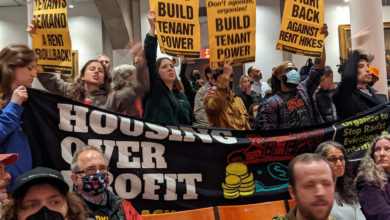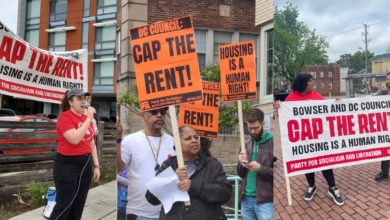The Party for Socialism and Liberation in Albuquerque is joining a new grassroots campaign against a proposed publicly-funded soccer stadium in downtown Albuquerque.
In May, New Mexico United, a professional men’s soccer team affiliated with the Division II USL Championship, launched a marketing initiative to leverage public resources to build an $85 million soccer stadium. The NM United owner, a millionaire investment banker, initiated the marketing ploy, stating, “This could be much more than a soccer stadium, this could be a community center … a place where we have art installations … It could drive a lot of economic development.”
The stadium proposal was quickly endorsed by Albuquerque Mayor Tim Keller, up for re-election in November. Mayor Keller has made support for the stadium central to his campaign and has gone on record defending the economic benefits of the proposal. To build the stadium, Mayor Keller’s administration proposed issuing $50 million in tax-revenue bonds — loans from banks that are paid back with interest by the public — and hired a consulting firm to conduct a feasibility study of potential sites. The published feasibility report recommended the stadium be built in the historic Albuquerque inner-city, including the Barelas and South Broadway neighborhoods.
Immediately, the stadium proposal was met with strong disapproval by the public. Albuquerque residents expressed strong opposition to the stadium, calling it ‘reckless’ and ‘egregious’. Despite this strong and overwhelming opposition, the Albuquerque City Council voted 7-2 to add the $50 million tax-revenue bond to the ballot for the Nov. 2 general election.
While Keller and the City Council are focused on squeezing $50 million out of Albuquerque residents for a stadium, overlapping social and economic crises are only getting worse. New Mexico ranks 49 in the United States in poverty with the “official” poverty rate in New Mexico at 18.2% percent, including 24.7% of all children. In 2019, homelessness in New Mexico was the highest in the nation, with a 27% increase overall, including a staggering increase of 57.6% in chronic homelessness. This increase in homelessness has been accompanied by skyrocketing costs of rent for New Mexicans.
Over the last year, the working class has seen a 13.57% rent increase with 100,000 households facing eviction when the statewide COVID-related pause on evictions is lifted. This out-of-control increase in the cost of rent will only be exacerbated by the building of a stadium. In cities that have built publicly-funded stadiums, rents have increased on average 8 percent, resulting in the expulsion of working-class majorities and causing permanent destruction of communities.
The stadium bond at its core is about one thing — jumpstarting the gentrification process in Albuquerque with an aim to clear out Albuquerque’s historic working-class neighborhoods and make room for higher-income residents.
Using public money to build stadiums for privately-owned sports clubs is part of a well-established pattern of capitalist development projects designed to increase the wealth and prosperity of the few while driving working-class communities further into the margins. The proposed Albuquerque stadium is yet another attempt to shape Albuquerque’s future around the profits of the ruling-class minority instead of the needs or wants of the working-class majority.
The proposed soccer stadium is only the latest offensive by local politicians and developers to advance gentrification of the Albuquerque area. Authors of the stadium plan have been explicit in this regard, recognizing that the goal of their development scheme is to drive out the homeless and act as the catalyst for high-end development consisting of expensive restaurants, exclusive condos and office buildings. Pro-stadium elites do not care that working-class residents will be pushed out into permanent housing insecurity and homelessness.
The Stop the Stadium campaign is a fight against gentrification and the planned displacement of Albuquerque’s historic working-class neighborhoods. Instead of using public money for the development of a stadium, the Stop the Stadium campaign demands using all available resources to cancel all rent and mortgage debt, make housing affordable and house the homeless.
To join in this struggle, visit here.
Photo credit: Liberation News screenshot of CAA ICON Architects feasibility of multi-use stadium, released by CABQ on July 23





